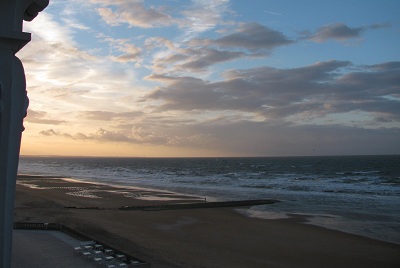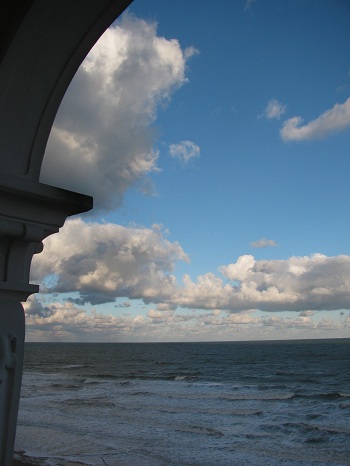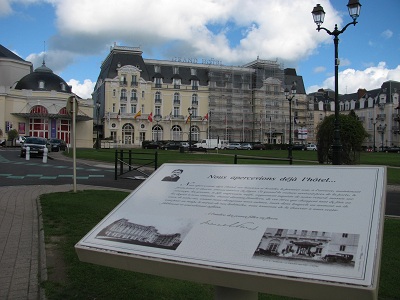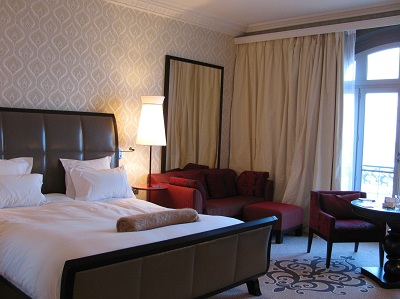
Part 1 of a three-part investigation into potentially romantic hotels on the Flowered Coast of Normandy, featuring the Grand Hotel in Cabourg, Les Manoirs de Tourgéville near Deauville, the Royal and Normandy Barriere Hotels in Deauville, several less luxurious hotels in the area and recommendable restaurants.
There’s no greater sign to a Parisian that she is justly appreciated by her husband, partner or married lover than to be whisked off for the weekend to a luxury hotel within two or three hours of the capital—to the Flowered Coast of Normandy, for example.
Two French female friends of mine in Paris have separately confided in me their dreams of just such a weekend. Not with me, mind you.
For one it’s the dream of a weekend at the Hotel Normandy in Deauville, the most luxury-minded town of the coast. She’s Norman by birth but it wasn’t until recently that she had the occasion to stay at the Normandy during a business meeting. That, she says, gave her a taste for the place. She is now awaiting the proper (or better yet, improper) invitation to return there for a carefree princess weekend a two-hour drive (or train) from Paris. She would do nothing all day but lie on the beach beneath a colorful parasol and make appointments at the seawater spa and sit in a café in town and lounge in the bar before going out for a long late dinner, or call for room service.
The other imagines that there’s nothing more romantic than a weekend at the Grand Hotel in Cabourg. She once walked through the lobby and now dreams of two day/two nights of bathing in a hotel where history and culture walk hand in hand, where she’d enjoy a long promenade along the beach followed by a long lie in the sand while her man tells her amusing stories while she watches sail gliders nearby, before going up to the room for a view that in itself it would be a form of kind of foreplay, and sighful post-play, too.
My two friends are sworn enemies to each other. I can’t invite them both to the same party because they’ll hiss at each other across the room. I don’t understand why. Well, I do, but it’s a long story involving a professional corporation, the French government, and perhaps a handsome stranger at a cocktail party, so it’s better not to go into it here.
Nevertheless, in order to understand my friends better, I set out for a few days from Paris to visit a luxury and otherwise potentially romantic hotels on the Flowered Coast of Normandy. I prefer to go on hotel investigations on my own, but I figured that whichever hotel I was most frustrated to be in alone would get my vote as the most romantic.
The Flowered Coast, la Côte Fleurie, stretches between the estuaries of the Seine and the Orne Rivers. It includes pretty port town of Honfleur, however I’ve set aside Honfleur for now so as to focus this three-part investigation on the area between Deauville and Cabourg.
The D-Day Landing Beaches of June 1944 start on the opposite side of the Orne, so all of the hotels in the three parts of this articles is practically situated for a daytrip to the WWII sites, 45-90 minutes away depending on your point of attack for the war sites. For explorations in the Landing Zone beyond a single day I typically recommend staying within that zone.
The Grand Hotel, Cabourg
All roads lead to the Grand Hotel and the adjacent casino in the planned town of Cabourg, just they lead to the Hotel Normandy and the adjacent casino in Deauville. In both cases, the final approach involves driving around or walking across around a grassy garden to get to the front door.
The Grand Hotel has only 72 rooms, including two vast suites, whereas the Normandy has 290, including 28 suites and apartments, but Cabourg’s garden is more impressive, a manicured circular spaced bordered by villa.
Going around or through the grassy circle feels grand from the start, and it feels grander still to enter the lobby and see, through the opposite end, the walkway above the beach and the sky beyond. It’s that direct access to the shore line that makes the Grand Hotel so special on a coast where the hotels are generally a full block or two from the beach.

My room was on a high floor overlooking the English Channel. The French call the channel La Manche, meaning The Sleeve, but think of it as the sea, as do I. On the afternoon of my arrival the sea is thrown about by a northwesterly wind. I hadn’t intend to take sides so soon on my friends’ Normandy fantasies, but looking out the window at the foreplay of the sea I felt a special affinity to the friend who dreams of weekends at the Grand Hotel. This is the best view of any of the major hotels on the coast.
Yet the Grand, now a 4-star hotel, is no longer as great as it was a century ago. In Deauville, The Normandy and its sister The Royal have five stars. Once rivals, they are now alternatives.
The original Grand Hotel was built on this site in 1861 as one of the first luxury establishments on the coast. For the next 50 years it was mostly uphill for this resort town, and Cabourg became a highly prized beach resort for aristocrats and the upper class during the Belle Epoque of the late 19th and early 20th centuries. In 1907 the Grand was built as we see it today. The adjacent casino, now far outshined by Deauville’s, was rebuilt in 1909.
Accompanying the well-to-do on their seasonal stay at the new Grand Hotel was the writer Marcel Proust (1871-1922). He’d visited Cabourg as a child with his grandmother, but the town especially promotes a remembrance to his prolonged stays from 1907 to 1914, a period during which he began work on A la recherché du temps perdu (Remembrance of Things Past or In Search of Lost Time). Caboug, which he calls Balbec in his work, is particularly present in the volume entitled In the Shadow of Young Girls in Flower.

Proust’s bedroom, furnished as it would have been at the time, can still be rented (at the same price as any other in its category). It’s among the smaller of the hotel’s 70 bedrooms (there are also two vast suites), but even the smallest rooms here are of comfortable size. Many of the rooms, including my own, are spacious. Rooms on the garden side, facing the town, are certainly appealing. I would sing their praises further were it not for the fact that my stay this time called for that magnificent sea view.
For the past century Proust’s name has been intimately associated with Cabourg. Quotations from his work are posted in the garden in front of the hotel and on the walkway, named Promenade Marcel Proust, between the hotel and the beach.
WWI would put an end to the association of aristocracy with the Grand Hotel, and the Normandy (1912) and the Royal (1913) in Deauville, built to rival the Grand, would eventually take over as the most celebrated hotels of the coast. The Grand Hotel was occupied by Germans during WWII as the local population deserted the town. I remember visiting Caboug in about 1990 and finding it limping along as a handsome has-been property of a chain hotel.
The Grand is now an Accor hotel, a group not known for the personality of its hotels, though its MGallery collection does include some nice properties, including this. (The ambassador of the MGallery collection is the actress Kristin Scott Thomas, who always manages to look so impressively bore.) Recent investments have restored much of the Grand, if not to its historical grandeur at least in such a way that it can hold its head high along the coast.

It’s rather straight-forward in its luxury these days, without surprises and, one might say, without excess (no extra staff to fawn over guests, no spa). A 3k run the length of the promenade is free. For coffee you go next door. There are golf courses a few miles away.
Unlike the Normandy it is not surrounded by a pride of luxury good shops, but a walk around Cabourg town reveals villas that still house discreet well-to-do seasonal visitors. Radiating out from the center of this planned town an aimless stroll reveals magnificent brick-and-stone villas with bay windows, built in the late 19th and early 20th centuries. (The slopes of the nearby resort of Houlgate have them in spades.)
For dinner that evening I went to Le Baligan, a moderately-priced fish bistro a few hundred yards from the hotel. I turned my back to the sullen muzzled blue lobster in the tank in the middle of the room and quite enjoyed the warm atmosphere. Fresh catches are simply prepared and served by men who appear to have recently changed into their waiter gray and blue after spending their youth out at sea. I ordered simple: a heart-warming fish soup with a peppery kick to it, a pleasing smoked haddock with mashed potatoes and carrots.
After dinner and a brief walk on the promenade above the beach, where I nodded kindly to a young terrier leading an elderly man on a leash, I returned to my room. No need to draw the curtains. The room was too big to sit in alone. At 11:30pm I went downstairs to feel the pulse of the hotel at night.

There was a whistle of wind in the hallway on the second floor. There was no one in the lobby. The bar was closed. A sign at the reception desk said “Dial 9.” Another whistle of wind called from the dining room, a grand space that once welcomed fame and fortune and beautiful hangers on and would, in the morning, offer croissants and coffee. It was a wondrous moment, an entire grand hotel for myself. Imagine how this would be à deux!
A town with a more effusive nightlife would allow a solitary travel have a drink the bar at this hour on a weekday. A more fabulous hotel would have some staff in sight. A more expensive hotel would have some luxury goods to promote.
But my friend with the Grand Hotel dream may be onto something. In its own, nearly forgotten off-season way, this may well be the most romantic hotel on the Flowered Coast.
Click here to continue to “Dreams of Romance on Normandy’s Flowered Coast, Part 2: Les Manoirs de Tourgéville.”
Click here to jump to “Dreams of Romance on Normandy’s Flowered Coast, Part 3: Deauville, Villers sur Mer, Houlgate.”
Le Grand Hotel, Jardins du Casino, 14390 Cabourg. Tel. 02 31 91 01 79. The hotel back onto the 2-mile long Promenade Marcel Proust, a nice seaside stretch for a morning jog or an evening stroll. The hotel has its own private beach space and there’s an indoor municipal swimming pool facing the beach by the hotel.
Cabourg Tourist Office, near Town Hall, place de l’Hotel de Ville. Tel. 02 31 06 20 00.
“Romantic Days” Film Festival. Since 1983 Cabourg has hosted an annual film festival in June focusing on romance. The festival has attracted about 11,000 visitors per year in recent years. The major film festival on the coast is Deauville’s American Film Festival, held in September.
Restaurant Le Baligan, 8 avenue Alfred Piat, 14390 Cabourg. Tel. 02 31 24 10 92.
Comments may be left at the bottom of this page.



Nice piece Gary. As a young girl we would go to Cabourg every summer for a month. My grandfather, Pépe, had an apartment which was part of the Grand Hotel complex, just to the right as you face the Casino. So, the circular gardens and the Promenade are very familiar to me.
One of the most wonderful parts of summer were pushing our little filets (nets) along the sea bottom…(at low tide we were in knee high water at most) to collect the little grey crevettes you see so often in Paris as part of a sea food platter. We would collect enough for ‘aperos’, go home and cook them and then eat them up. This we did nearly every day. We also drank a lot of “Cidre Boucher” …
The wide beaches were a great place to make friends.. so there would be about a dozen of us kids playing together until it was time to go home.. for lunch, then for dinner. Sometimes we would explore up the beach, away from our parents, in the abandoned bunkers which were still too recent to be tourist attractions – this was in the early 60’s – back when Johnny Haliday was a handsome, brand new star and his ‘Retien la Nuit’ was at the top of the charts.
I still have fond memories of the hard candy poured into sea shells (a stick-less lolly pop) as well as the shops filled with seashell boxes, frames and dolls. They fascinated me .
Marie.
Thanks for the memories!
How about expanding them into a “Cabourg Memories” piece for France Revisited’s The Arts/Writing section?
Gary